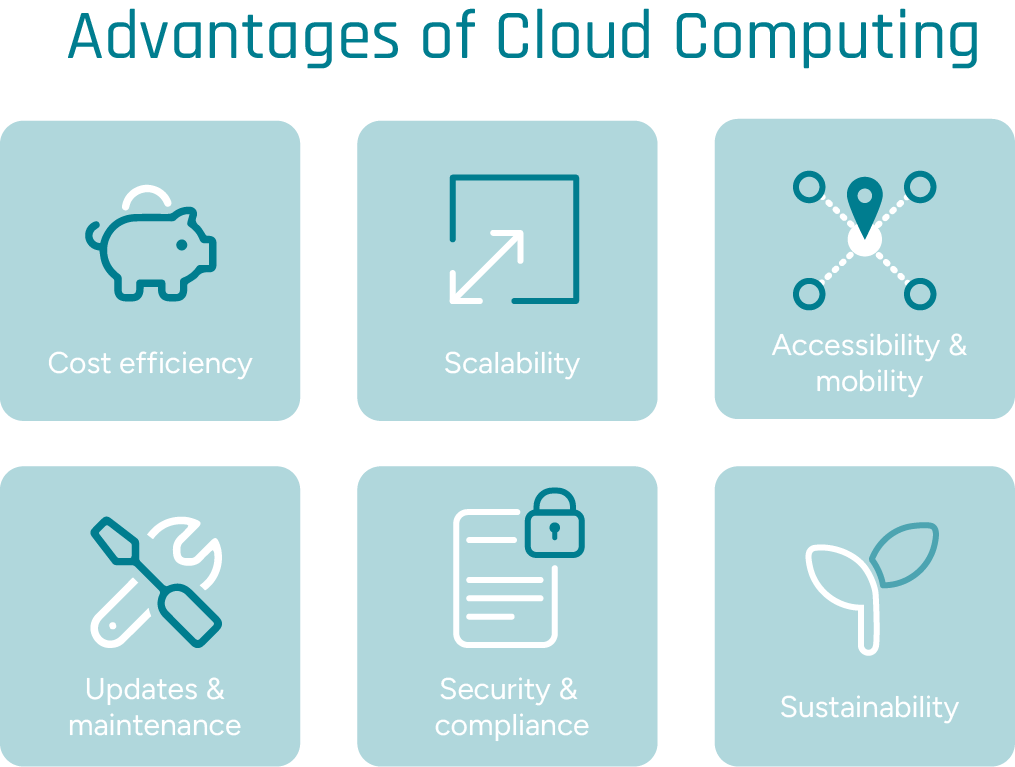What is Cloud Computing?
In short, cloud computing makes it possible to access data via the internet from practically anywhere. Companies often work together with specialized cloud providers and rent their IT infrastructure as required.
As part of the collaboration, companies then have flexible access to the rented IT resources (software and hardware) and can work with data, applications and more without having to maintain the infrastructure themselves. All that is needed is a reliable Internet connection.
How Cloud Computing Works
Professional providers of cloud computing solutions generally operate individual or multiple data centers with correspondingly large computing resources. Using virtualization, these physical computing resources can be partitioned into small parts and provided virtually - simply according to the customer's requirements.
Common Examples of the Use of Cloud Computing
- Cloud Storage (simple storage of images / texts / videos / data)
- Hosting (provision of hosting solutions for websites or store pages via the cloud to ensure a high level of reliability)
- Streaming (use of cloud infrastructure for the global on-demand provision of streaming services)
- Software-as-a-Service (provision of SaaS solutions / access to cloud-based applications without client-side installation of the software
The possibilities and advantages of cloud computing services are now being used both by private users and increasingly by companies of all sizes. The advantages that make established cloud solutions such as our GFOS knownCloud so interesting for companies are discussed in the next section.

Cloud computing offers numerous advantages compared to on-premise solutions. © GFOS Group
Cloud Computing - Advantages at a Glance
Companies considering the use of professional cloud computing solutions should take particular account of the following advantages of the technology.
Cost Efficiency
If companies rely on cloud solutions, this leads to considerable savings in the area of IT infrastructure. Instead of making costly investments in servers, storage solutions and software licenses, companies can use cloud services to simply obtain all the software and hardware they need as and when they need it. Excess licenses and unused server capacity are ideally a thing of the past.
At the same time, the company also eliminates all expenses and costs associated with maintaining and servicing the IT infrastructure. The cloud provider takes care of all these points. When it comes to pricing, many cloud providers offer a range of flexible options such as subscription models, usage-based pay-as-you-go variants or other systems that provide companies with a good mix of flexibility and predictability.
Scalability
One of the biggest advantages of cloud computing is the almost unlimited scalability of IT resources. Companies can flexibly adapt their resources to current demand without having to purchase additional hardware. Typically, these additional services/capacities can be booked within a very short time.
As part of seasonal campaigns or special events, companies can make use of additional IT resources with little effort and are therefore not limited by their technical capabilities. This allows companies to focus all their resources on important business activities, which is particularly important for (fast-growing) start-ups.
Availability
Cloud computing enables teams to work together efficiently regardless of their location. Thanks to the availability of data and applications via the cloud, employees can collaborate on projects and/or exchange information in real time and from any location.
If the environment is set up accordingly, shared access via the cloud enables fully-fledged collaborative working. Companies can also be sure that employees always have the latest versions of data records, which creates the ideal conditions for collaboration without any frictional losses or inefficiencies.
Up-To-Dateness
If members of a team work with different versions of software, this can lead to problems from time to time, for example when exchanging files. An important advantage of cloud computing is the fact that the regular updating of software versions or hardware upgrades is the responsibility of the cloud provider. Software-as-a-Service (SaaS) solutions are a common example of this.
On the one hand, this eliminates the need for companies to provide IT resources for the regular evaluation and updating of hardware and software. On the other hand, it ensures that all cloud tools and applications comply with the latest standards/versions. In addition, these automated updates on the provider side ensure high availability of services on the customer side.
Compliance
Professional cloud providers are able to offer their customers solutions that provide both a high level of reliability and maximum data protection. Due to the specialized offering, the security measures in the data centers often go far beyond what individual companies could (economically) afford in terms of security measures.
This is particularly important for companies that have to adhere to strict compliance requirements when handling (customer) data. But even with regard to the GDPR, companies do not run the risk of their data becoming an (easy) target for cyber criminals thanks to high security standards on the part of providers. This is because attacks on companies - and the damage caused by data theft - are increasing from year to year.
Sustainability
Another area in which cloud computing offers advantages is in terms of sustainability. Companies no longer have to maintain their own hardware and (surplus) IT resources, but simply use the solutions of specialized cloud providers as required.
Ideally, this not only saves on technical equipment such as servers etc., but also reduces a company's electricity consumption - simply because these systems do not exist in-house. The providers themselves can optimize their data centers for both effectiveness and an efficient power supply.
Cloud Computing – These Companies Benefit from the Technology
A cloud computing solution is particularly suitable for companies that require a particularly powerful and flexible IT infrastructure.
Young start-ups as well as SMEs and large corporations are taking advantage of the fact that their own IT resources can be easily scaled as required with the help of a cloud solution. From the ability to reduce operating costs to the secure networking of multinational teams for large-scale projects, there is a suitable use case for practically all company sizes.
Overview of Sectors
The advantages of cloud computing technology are already being used in these sectors:
E-Commerce
High level of security in online retail and easy scalability of resources, e.g. for promotions or large crowds.
Industry / Manufacturing
Of central importance for IoT applications, ideal for cross-location data collection and for analyzing workflows and processes
Financial Service Providers
Automation of many business processes using cloud computing, also essential for fast data analysis and processing
Logistics / Transportation
Simple coordination of logistics processes, ideal for route planning and fleet management
Technology Companies
Use of cloud services for data analysis, development processes (IaaS / PaaS), as well as for computing-intensive AI applications and much more
These are just a few examples of many other industries in which a wide variety of use cases for cloud technology have long existed. We will also be happy to work with you to find suitable areas of application in line with your requirements.
How Companies are Using the Technology for Themselves
If companies are considering switching to cloud services in whole or in part, the following points should be considered in advance:
Analysis of your own IT
It is of primary importance for companies to objectively record the status of their own IT. A precise picture of the status quo with a list of all users as well as all relevant applications and more forms the basis here.
Definition of Needs
What IT needs are there today? What are the company's future plans and what will be needed in the future? When it comes to specifying IT requirements, it can be helpful to take advantage of professional IT infrastructure consulting. In this way, potentially costly planning errors can be avoided in the early planning phases.
Selecting the Provider
When selecting a cloud computing provider, companies should make sure that it meets all the (service) criteria defined in advance. Is the security of its systems proven?
How easy is it to connect to your own systems?
Does the provider provide support? How easily or quickly can services be scaled?
What cost structure does the service provider offer? Are there special service level agreements (SLAs)?
If companies pay attention to these points, this provides a good basis for being able to use the advantages of a cloud computing solution for their own IT in the future. We will be happy to advise you on this with our expertise.
